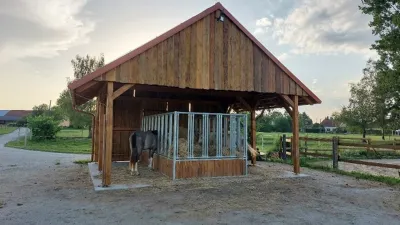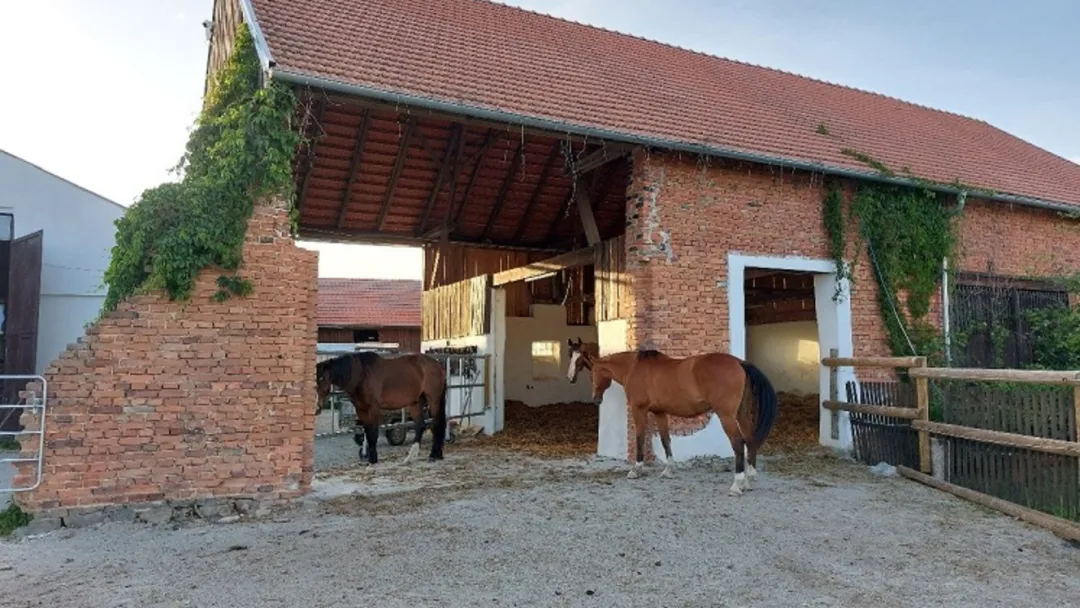General information
RDP Priority
- P2. Competitiveness
RDP Focus Area
- 2A: Farm’s performance, restructuring & modernisation
RDP Measure
- M16: Cooperation
Beneficiary type
- Farmer / land manager
Summary
Enhanced welfare standards contribute to the overall health and well-being of horses, which is also essential for their productivity and longevity. Improved living conditions, access to proper nutrition and regular veterinary care can lead to healthier horses that perform better. This ultimately translates into increased profitability for farmers as healthier horses are more valuable assets.
The Čoudek family’s horse breeding farm in Czechia used EU funds from the CAP to improve animal welfare and develop their rural business ventures. Their farm has 70 hectares of organic land and an agri-tourism business. They wanted to ensure optimal conditions for animal well-being and boost staff productivity by improving stabling facilities.
Overcoming problems from previous box housing for horses involved goals to reduce health risks and allow more natural behaviour by better movement possibilities and improved contact between horses. The CAP funding for competitiveness covered costs from structural farm modifications and the purchase of new technology.
Results
- Higher number of foals bred.
- Higher sales and faster return on the project investment from happier animals.
- Economic savings in terms of labour costs and animal welfare costs.
- Improving equestrian sport and hobby services for tourists and residents.
- Improving working conditions for farm staff.
- Creation of conditions for the completion of internships and the possibility of research tasks for university students and teachers within the premises of the farm.

Promoter
František Čoudek
Funding
Total project cost: 197 271 (EUR)
EAFRD: 29 098 (EUR)
National/Regional: 29 686 (EUR)
Private/own: 138 487 (EUR)
Ressourcen
Context
Ensuring high welfare standards for commercial horse farms presents advantages, both for the animals themselves and for the broader agricultural economy. Enhanced welfare standards contribute to the overall health and well-being of horses, which is also essential for their productivity and longevity. Improved living conditions, access to proper nutrition and regular veterinary care can lead to healthier horses that perform better. This ultimately translates into increased profitability for farmers as healthier horses are more valuable assets.
Adopting higher welfare standards can enhance a farm's reputation within the community and among consumers. In an era where ethical considerations play a critical role in consumer decision-making, farms that prioritise animal welfare may attract a more conscientious clientele willing to pay premium prices for ethically sourced services.
In Czechia, this shift not only benefits individual farmers but also promotes a positive image of Czech agriculture on an international scale, potentially opening new markets. Additionally, investing in better welfare practices aligns with increasing regulatory pressures regarding animal husbandry across Europe. By proactively improving welfare standards, Czech farmers can ensure compliance with current and future regulations, thus avoiding potential legal repercussions or penalties. This forward-thinking approach positions them advantageously within the competitive landscape of European agriculture.
The Čoudek family’s horse breeding farm in Lužnicí utilised EU funds from the CAP to enhance Czech animal welfare and expand their rural business ventures. Their farm has 70 hectares of organic land and an agri-tourism business. A project proposal for rural development funding was designed with advice from scientific experts.
Objectives
The farm wanted to ensure optimal conditions for its animals’ well-being and improve staff productivity with better stabling facilities.
Overcoming problems from previous box housing for horses involved goals to reduce health risks and allow more natural behaviour by better movement possibilities and improved contact between horses.
Specific objectives for the project were to
- Improve animal welfare and health and ensure a high level of animal hygiene.
- Ensure maximum welfare conditions corresponding to the natural behaviour of the animals.
- Reduce feed wastage and increase feed efficiency.
- Streamline working operations, reduce labour intensity, save labour costs, and reduce the cost of veterinary and breeding operations.
The success of the new horse welfare system would depend on individual functional areas being well designed (with knowledge of the ethology of horses) to include rest areas, drinking stations, feeding machines with kernel and roughage, rolling areas and paddock access as good practice standards.
Activities
- Preparation of a cooperation agreement with a cooperating scientific institution – the University of South Bohemia in České Budějovice.
- In cooperation with the scientific institution, a complex system of active horse housing was planned for optimal breeding of mares, foals and young horses. This institution participated in the design of technical solutions to ensure maximum functionality of the entire system.
- The structural modifications to the farm site were carried out, the basis of which was to ensure the free housing of the animals and the creation of several functional areas (resting area, feeding area, watering area, integration area and grazing area).
- Purchase of the necessary technology for automatic horse breeding – feed dispensers, hay machines, drinking stations, feeding control computer with monitor and software, leg chips with transponder and selection gates with control.
- Within the framework of cooperation with the scientific institution, innovative methodologies and procedures for breeding horses in active housing were developed, applied and verified during the project. The benefits of innovative active horse housing were evaluated from an animal welfare perspective in comparison with box housing.
Main results
- Higher number of foals bred.
- Healthy and mentally resilient animals ensure higher sales and faster return on the project investment.
- Economic savings in terms of labour costs and animal welfare costs.
- Optimal welfare of individual horse groups within the farm.
- Improving the offer for non-farmers interested in housing and caring for their horses, and improving the range of services for equestrian sport in a tourist attraction area.
- Improving working conditions for farm staff.
- Creation of conditions for the completion of internships and the possibility of research tasks for university students and teachers within the premises of the farm.
Key lessons
- For any species of animal, the ethology of the behaviour of the animal should be considered when setting the conditions for its breeding, so that the animals are provided with the most suitable conditions for their life.
- Thanks to this farm’s CAP-funded project, the village of Mažice was awarded the Orange Ribbon in 2022 for its cooperation with the agricultural entity in the national village of the year competition.
František Čoudek

